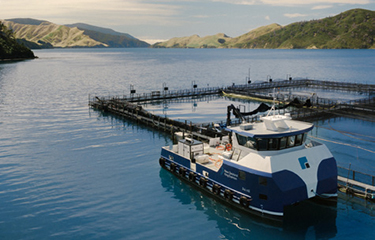New Zealand King Salmon posts profit in FY23 after challenging FY22

New Zealand King Salmon announced it made a profit in fiscal year 2023, reversing losses in FY2022 despite smaller sales volumes and lower revenue – a development partially aided by the company reducing its staff by 20 percent.
In its full-year 2023 results the company posted a net profit of NZD 1.9 million (USD 1.19 million, EUR 1.08 million), a reversal compared to the NZD 73.2 million (USD 46.2 million, EUR 41.7 million) loss it posted in FY22. The previous year was punctuated by an increase in sea farm mortalities which led the company to offer existing shareholders a deal on new company shares in an effort to pay off heightened debt.
The increase in net profit was in contrast to a drop in both revenue and volume. The company sold 5,837 metric tons (MT) of salmon in FY23, compared to 7,672 MT sold in FY22, a decrease of 24 percent. Comparatively, revenue decreased by a smaller amount, from NZD 174.5 million (USD 110.1 million, EUR 99.6 million) in FY22 to NZD 167.1 million (USD 105.4 million, EUR 95.3 million) in FY23, a decrease of 4 percent.
The lower harvest totals, the company said in its annual report, are a result of new harvest strategies designed to mitigate the high mortalities it faced. As a result, New Zealand King Salmon reduced its staff by “around 20 percent,” which the company said mostly came through “natural attrition” that was aided by a strong labor market.
FY23 pro-forma earnings before interest, taxes, depreciation, and amortization (EBITDA) was a loss of NZD 4.4 million (USD 2.7 million, EUR 2.5 million), compared to an EBITDA gain of NZD 6.7 million (USD 4.2 million, EUR 3.8 million) in FY22. The gains in FY22, the company said, were related to NZD 13.5 million (USD 8.5 million, EUR 7.7 million) of gains from the early close of FX contracts.
The company added that costs related to mortality increased in FY23 to NZD 25.9 million (USD 16.3 million, EUR 14.7 million), up from NZD 20.6 million (USD 13.0 million, EUR 11.7 million) in FY22.
The mortality costs in FY23, New Zealand King Salmon Chair John Ryder said, were partially related to the company’s balance date of 31 January, which causes the summer months to be split across two financial years.
Ryder said the return to profitability comes after a “particularly difficult period” for the company. New Zealand King Salmon faced high mortality after the country had its hottest summer on record, which according to the company’s annual report resulted in “extremely high fish mortalities” throughout January, February, and March and record losses in FY22.
Those mortalities pushed the company to change its approach, Ryder and Acting CEO Graeme Tregidga said. Tregidga was appointed to the role of acting CEO following the abrupt resignation of prior CEO Grant Rosewarne, who had been with the company for 13 years.
“We needed smarter strategies, with fish health being our number one priority,” the pair said in the annual report.
As a result, the company decided to harvest fish at different times to avoid the heat of the summer.
“In a supplementary strategy, we implemented a seasonal harvest, whereby we harvest smaller fish as additional volume prior to the summer months. Towards the end of FY23, we successfully completed the first seasonal harvest from Ruakaka farm in the Queen Charlotte Sound, resulting in an approximate increase of 750 [MT] of biomass,” Ryder said. “The key lesson in facing adversity is how you react to it. The Board and leadership team have made significant changes to our operations that gives us confidence for the future.”
The new farming strategies have been effective in the current summer period – which runs from 1 December to 22 March in New Zealand – and according to Ryder the results have been positive. Mortality costs have been reduced from NZD 13.5 million (USD 8.5 million, EUR 7.7 million) to NZD 2 million (USD 1.2 million, NZD 1.1 million), a “significant improvement on the same period last year,” he said.
“In a simple but significant move, we decided to avoid the detrimental effect that warmer summer temperatures had on our fish, rather than fight it,” Ryder and Tregidga said.
The company added in its performance highlights that the new harvest strategy “outperformed initial expectations.”
Tregidga said the company’s resource consent application for the Blue Endeavor project – part of its efforts to expand its aquaculture operations into the open ocean – was approved.
“We had two appeals that the company hopes to mediate to a successful conclusion,” he said.
Photo courtesy of New Zealand King Salmon






Share